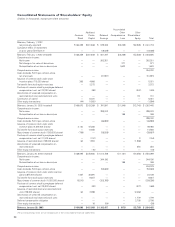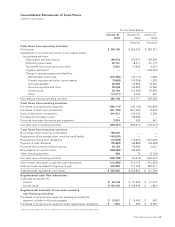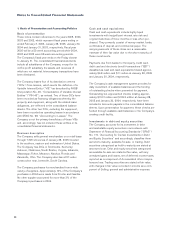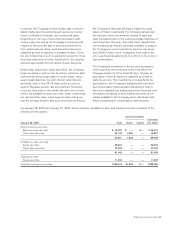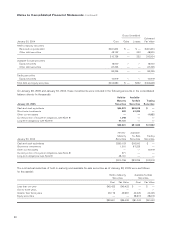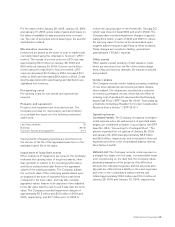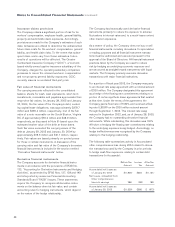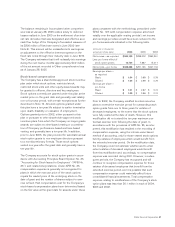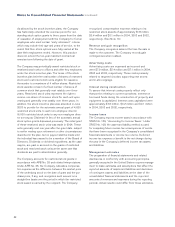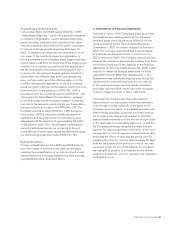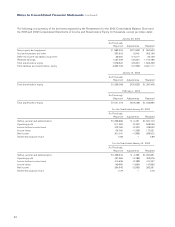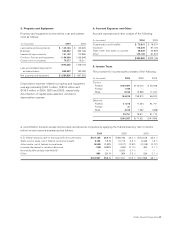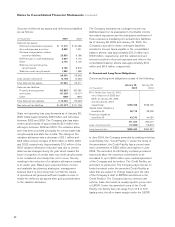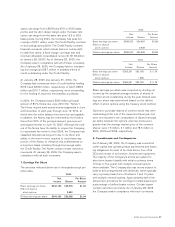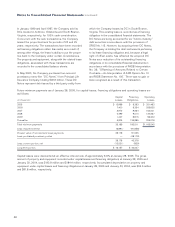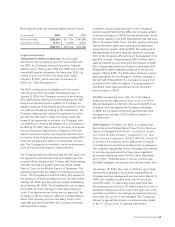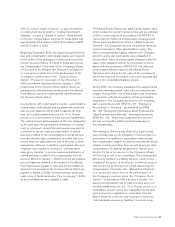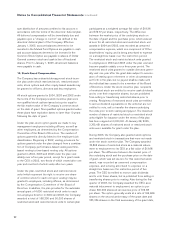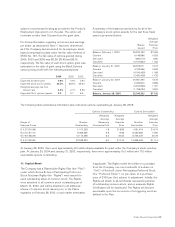Dollar General 2004 Annual Report Download - page 45
Download and view the complete annual report
Please find page 45 of the 2004 Dollar General annual report below. You can navigate through the pages in the report by either clicking on the pages listed below, or by using the keyword search tool below to find specific information within the annual report.Dollar General Corporation 43
Accounting pronouncements
In December 2004, the FASB issued SFAS No. 123R,
“Share-Based Payment,” which will require all companies
to measure compensation cost for all share-based pay-
ments (including employee stock options) at fair value.
This new standard will be effective for public companies
for interim or annual periods beginning after June 15,
2005. Companies can adopt the new standard in one of
two ways: (i) the modified prospective application, in
which a company would recognize share-based employee
compensation cost from the beginning of the fiscal period
in which the recognition provisions are first applied as if
the fair-value-based accounting method had been used
to account for all employee awards granted, modified or
settled after the effective date and to any awards that
were not fully vested as of the effective date; or (ii) the
modified retrospective application, in which a company
would recognize employee compensation cost for periods
presented prior to the adoption of SFAS No. 123R in
accordance with the original provisions of SFAS No. 123,
“Accounting for Stock-Based Compensation,” pursuant
to which an entity would recognize employee compensa-
tion cost in the amounts reported in the pro forma disclo-
sures provided in accordance with SFAS No. 123. The
Company expects to adopt SFAS No. 123R during the
third quarter of 2005, using the modified prospective
application, and expects to incur incremental expense
associated with the adoption of approximately $4 million
to $8 million in 2005. See “Stock-based compensation”
above for additional disclosures pertaining to the pro
forma effects of stock option grants as determined using
the methodology prescribed under SFAS No. 123.
Reclassifications
Certain reclassifications of the 2003 and 2002 amounts
have been made to conform to the 2004 presentation,
including the reclassification of certain short-term invest-
ments which were previously classified as cash and cash
equivalents as further described above.
2. Restatement of Financial Statements
Following a review of the Company’s lease accounting
and leasehold amortization practices, the Company
identified areas where its practices differed from the
views expressed by the Securities and Exchange
Commission (“SEC”) in a letter released on February 7,
2005. The Company determined that it would change
its practices, as discussed below, to conform to the
SEC’s views and GAAP. The Company determined that,
because the cumulative adjustments resulting from these
corrections would have been material to the financial
statements for the year ended January 28, 2005, it was
required to restate its financial statements for fiscal
years 2000 through 2003 (the “Restatement”). The
Restatement was technically required even though the
adjustments for each individual year are not material
to that year’s previously reported results (including
previously reported 2004 results) and have no impact
on the Company’s current or future cash flows.
Previously, the Company amortized all leasehold
improvements over eight years, which was estimated
to be the approximate useful life of the asset to the
Company, given the nature of the assets and historical
lease renewal practices. Under the corrected method,
the Company has changed its practice to amortize
leasehold improvements over the shorter of eight years
or the applicable non-cancelable lease term. In addition,
the Company previously recognized straight-line rent
expense for leases beginning on the earlier of the store
opening date or the rent payment commencement date,
which had the effect of excluding the period used for
preparing the store for opening (approximately 30 days)
from the calculation of the period over which rent was
expensed. Under the corrected method, the Company
has changed its practice to include the period of time
needed to prepare the store for opening in its calculation
of straight-line rent.



